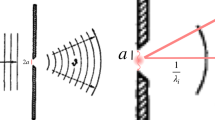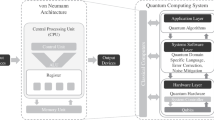Abstract
The subjective Bayesian interpretation of quantum mechanics (QBism) and Rovelli’s relational interpretation of quantum mechanics (RQM) are both notable for embracing the radical idea that measurement outcomes correspond to events whose occurrence (or not) is relative to an observer. Here we provide a detailed study of their similarities and especially their differences.
Similar content being viewed by others
Notes
In QBism I cannot meaningfully posit that there is another version of ‘me’ who had a different experience; per definition that other person would not be ‘me’.
Rovelli has implied in Ref.[28] and elsewhere that RQM is agnostic to the direction of time. This implies that we may choose the observer’s proper time to increase in either direction, corresponding to different ways of defining the observer’s ‘history’ and ‘future’, hence different ways of defining their perspective and state assignments.
More plausibly, doing so might result in something resembling Healey’s pragmatist interpretation.
QBism does not make any special assumptions about what kinds of things can satisfy these requirements: perhaps machines and other complex arrangements of inanimate matter could qualify. Rather, the question of agency is taken as a pragmatic assumption: so long as it is useful to think of a given entity as choosing actions in order to attain certain ends, then normative rules may be employed in modeling it.
Note that it is possible to interpret probabilities as objective and still conclude that quantum theory is normative. For instance, in Healey’s interpretation probabilities are objective in the sense that there is an objectively ‘best’ quantum state assignment for a given agent. Nevertheless, like in QBism, probabilities are taken to be the agent’s degrees of belief, so the rules of quantum theory are normative in Healey’s account.
Formally, this means the agent holds several ‘generic’ beliefs about how systems respond to measurements, as well as the ‘quantum-specific belief’ that the number of outcomes of a minimal informationally complete measurement of the system is equal to the square of it’s maximum information storage capacity (i.e. its dimension). See [13] for details.
Note that in order to pose the scenario in QBism we must assume that the agents initially agree that they are measuring the same atom using the same practical procedure. There is no conflict here: nothing in QBism forbids agreement; our question is whether there is anything that makes it mandatory.
It would be interesting to investigate whether holding certain beliefs might compel agents to agree in order to avoid being incoherent; but that is a different question than the one we are considering here.
References
Fuchs, C.A.: QBism, the Perimeter of Quantum Bayesianism (2010). eprint: arXiv:abs/1003.5209 [quant-ph]
Fuchs, C.A.: Interview with a Quantum Bayesian, in Elegance and Enigma: The Quantum Interviews (M. Schlosshauer, ed.), Springer, Frontiers Collection eprint: arXiv:abs/1207.2141 [quant-ph] (2011)
Fuchs, C.A., Schack, R.: Quantum-Bayesian coherence. Rev. Mod. Phys. 85, 1693–1715 (2013)
Fuchs, C.A., Mermin, N.D., Schack, R.: An introduction to QBism with an application to the locality of quantum mechanics. Am. J. Phys. 82(8), 749–754 (2014)
Fuchs, C.A.: On Participatory Realism, 2016. eprint: arXiv:abs/1601.04360 [quant-ph]
Fuchs, C.A.: Notwithstanding Bohr, the Reasons for QBism. Mind Matter 15(2), 245–300 (2017)
Fuchs, C.A.,Stacey, B.C.: QBism: Quantum Theory as a Hero’s Handbook, in Proceedings of the International School of Physics Enrico Fermi Course 197—Foundations of Quantum Physics (E. M. Rasel, W. P. Schleich, and S. Wölk, eds.), pp. 133–202, IOS Press, Amsterdam; Società Italiana di Fisica, Bologna, (2019)
Stacey, B.C.: Ideas Abandoned en Route to QBism, (2019). eprint: arXiv:abs/1911.07386 [quant-ph]
DeBrota, J.B., Stacey, B.C.: FAQBism, (2019). eprint: arXiv:abs/1810.13401 [quant-ph]
Stacey, B.C.: Quantum Theory as Symmetry Broken by Vitality, (2019). eprint: arXiv:abs/1907.02432 [quant-ph]
Pienaar, J.: Extending the agent in QBism. Found. Phys. 50, 1894–1920 (2020)
DeBrota, J.B., Fuchs, C.A., Schack, R.: Respecting one’s fellow: QBism’s analysis of Wigner’s Friend. Found. Phys. 50, 1859–1874 (2020)
DeBrota, J.B., Fuchs, C.A., Pienaar, J.L., Stacey, B.C.: Born’s rule as a quantum extension of Bayesian coherence. Phys. Rev. A 104, 022207 (2021)
Rovelli, C.: Relational quantum mechanics. Int. J. Theor. Phys. 35(8), 1637–1678 (1996)
Laudisa, F.: The EPR argument in a relational interpretation of quantum mechanics. Found. Phys. Lett. 14, 119–132 (2001)
Smerlak, M., Rovelli, C.: Relational EPR. Found. Phys. 37, 427–445 (2007)
Brown, M.J.: Relational quantum mechanics and the determinacy problem. Br. J. Philos. Sci. 60(4), 679–695 (2009)
van Fraassen, B.C.: Relational Quantum Mechanics: Rovelli’s world. Discusiones Filosóficas 11, 13–51 (2010)
Dorato, M.: Rovelli’s Relational Quantum Mechanics, Anti-Monism, and Quantum Becoming, in The Metaphysics of Relations (A. Marmodoro and D. Yates, eds.), pp. 235–262, Oxford: Oxford University Press, (2016)
Ruyant, Q.: Can we make sense of Relational Quantum Mechanics? Found. Phys. 48(4), 440–455 (2018)
Trassinelli, M.: Relational Quantum Mechanics and probability. Found. Phys. 48, 1092–1111 (2018)
Krismer, R.: Representation lost: the case for a relational interpretation of quantum mechanics. Entropy 20, 975 (2018)
Laudisa, F.: Open problems in Relational Quantum Mechanics. J. Gen. Philos. Sci. 50, 215–230 (2019)
Martin-Dussaud, P., Rovelli, C., Zalamea, F.: The notion of locality in Relational Quantum Mechanics. Found. Phys. 49(2), 96–106 (2019)
Pienaar, J.: Comment on The notion of locality in Relational Quantum Mechanics. Found. Phys. 49, 1404–1414 (2019)
Yang, J.M.: A Relational Formulation of Quantum Mechanics. Sci. Rep. 8(1), 13305 (2018)
Laudisa, F., Rovelli, C.: Relational quantum mechanics. In: E. N. Zalta (ed.) The Stanford Encyclopedia of Philosophy. Metaphysics Research Lab, Stanford University, Spring (2021)
Rovelli, C.: Space is blue and birds fly through it. Philos. Trans. R. Soc. A 376, 20170312 (2018)
Calosi, C., Mariani, C.: Quantum relational indeterminacy. Stud. Hist. Philos. Sci. Part B 71, 158–169 (2020)
Oldofredi, A.: The bundle theory approach to Relational Quantum Mechanics. Found. Phys. 51(1), 18–18 (2021)
Di Biagio, A., Rovelli, C.: Stable facts, relative facts. Found. Phys. 51(1), 30 (2021)
Brukner, Č: Facts are relative. Nat. Phys. 16, 1172–1174 (2020)
Brukner, Č: A no-go theorem for observer-independent facts. Entropy 20(5), 350 (2018)
Brukner, Č: On the quantum measurement problem. In: Bertlmann, R., Zeilinger, A. (eds.) Quantum [Un]Speakables. II The Frontiers Collection. Springer, Cham (2017)
Müller, M.P.: Law without law: from observer states to physics via algorithmic information theory. Quantum 4, 301 (2020)
J. L. Pienaar, A quintet of quandaries: five no-go theorems for Relational Quantum Mechanics, 2021. eprint: arXiv:abs/2107.00670 [quant-ph]
Bong, K.-W., Utreras-Alarcón, A., Ghafari, F., Liang, Y.-C., Tischler, N., Cavalcanti, E.G., Pryde, G.J., Wiseman, H.M.: A strong no-go theorem on the Wigner’s friend paradox. Nat. Phys. 16, 1199–1205 (2020)
Cavalcanti, E.G.: The view from a Wigner Bubble. Found. Phys. 51, 39 (2021)
Baumann, V., Del Santo, F., Brukner, Č: Comment on Healey’s quantum theory and the limits of objectivity. Found. Phys. 49, 741–749 (2019)
V. Baumann and Č. Brukner, Wigner’s Friend as a Rational Agent, in Quantum, Probability, Logic: The Work and Influence of Itamar Pitowsky (M. Hemmo and O. Shenker, eds.), pp. 91–99, Cham: Springer, 2020
Frauchiger, D., Renner, R.: Quantum theory cannot consistently describe the use of itself. Nat. Commun. 9, 3711 (2018)
Healey, R.: Quantum theory and the limits of objectivity. Found. Phys. 48, 1568–1589 (2018)
Proietti, M., Pickston, A., Graffitti, F., Barrow, P., Kundys, D., Branciard, C., Ringbauer, M., Fedrizzi, A.: Experimental test of local observer independence. Sci. Adv. 5(9), eaaw9832 (2019)
Baumann, V., Wolf, S.: On formalisms and interpretations. Quantum 2, 99 (2018)
M. S. Leifer, What are Copenhagenish interpretations and should they be perspectival?, 2018. Talk given at Wigner’s Friend Workshop, Boston. Link: https://www.youtube.com/watch?v=C-C_K-gK6q4
Brukner, Č, Zeilinger, A.: Information and fundamental elements of the structure of quantum theory. In: Castell, L., Ischebeck, O. (eds.) Time, Quantum and Information, pp. 323–354. Springer, Berlin (2003)
Bub, J., Pitowsky, I.: Two dogmas about quantum mechanics. In: Saunders, S., Barrett, J., Kent, A., Wallace, D. (eds.) Many Worlds?: Everett, Quantum Theory, & Reality. Oxford University Press, Oxford (2010)
J. Bub, Two dogmas’ redux, 2019. eprint: arXiv:abs/1907.06240 [quant-ph]
Harrigan, N., Spekkens, R.W.: Einstein, incompleteness, and the epistemic view of quantum states. Found. Phys. 40, 125–157 (2010)
Bell, J.: Against measurement. Phys. World 3, 33 (1990)
P. Höhn, Toolbox for reconstructing quantum theory from rules on information acquisition, 2014. eprint: arXiv:abs/1412.8323 [quant-ph]
Höhn, P.A., Wever, C.S.P.: Quantum theory from questions. Phys. Rev. A 95,(2017)
Acknowledgements
I am grateful to Carlo Rovelli and Andrea Di Biagio for enlightening and cordial correspondence about the differences between RQM and QBism. I also thank Chris Fuchs, Blake Stacey and John DeBrota for feedback on an early draft. This work was supported in part by the John E. Fetzer Memorial Trust.
Author information
Authors and Affiliations
Corresponding author
Additional information
Communicated by Carlo Rovelli.
Publisher's Note
Springer Nature remains neutral with regard to jurisdictional claims in published maps and institutional affiliations.
Rights and permissions
About this article
Cite this article
Pienaar, J. QBism and Relational Quantum Mechanics compared. Found Phys 51, 96 (2021). https://doi.org/10.1007/s10701-021-00501-5
Received:
Accepted:
Published:
DOI: https://doi.org/10.1007/s10701-021-00501-5




